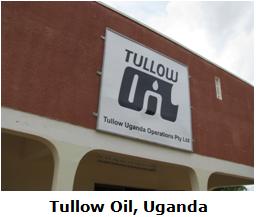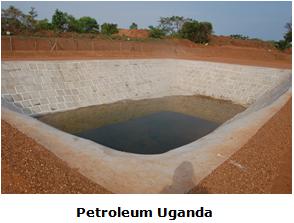 ReConnect Africa is a unique website and online magazine for the African professional in the Diaspora. Packed with
essential information about careers, business and jobs, ReConnect Africa keeps you connected to the best of Africa.
ReConnect Africa is a unique website and online magazine for the African professional in the Diaspora. Packed with
essential information about careers, business and jobs, ReConnect Africa keeps you connected to the best of Africa.

 The month of February witnessed developments in the electricity generation, oil and gas sectors of Uganda's economy.
The month of February witnessed developments in the electricity generation, oil and gas sectors of Uganda's economy.
These developments have largely been positive, contributing to the onward march to harness the full potential of Uganda's oil reserves. Furthermore the crippling power cuts witnessed from the last quarter of 2011 were ameliorated during the same month.
The month of February, marked a milestone in Uganda's energy sector. There was a formal overhaul of the over two decade oil legislation. The Petroleum (Exploration, Development and Production) Bill, 2012, provides for a unified governance system for Uganda's oil and gas industry, managing the country's significant oil reserves in the Albertine Graben.
This landmark bill envisages the establishment of a Petroleum Authority of Uganda, furthermore it seeks to regulate royalties, fashion a transparent and competitive licensing process as well as environmental provisions to restore lands degraded by the petroleum production process. This bill is currently under scrutiny by the parliamentary Committee on National Resources. In line with parliamentary and legislative tradition, the committee will hold public debates and discussions on the subject with a broad spectrum. Upon which the bill will tabled in the august house for commencement of debate.
The first draft of the bill was unveiled to the public in March of 2010, drawing widespread reviews and an overwhelming viewpoint that it required additional review. Key stakeholders stated that the bill urgently needed role clarification of diverse institutions and agencies, whose overlapping mandates could hinder effective governance and accountability.
Despite the existence of a parliamentary moratorium on any new oil pacts passed in October 2011, subject to the enactment of a new petroleum law, in the month of February Government of Uganda revealed that it had signed two production sharing agreements with Tullow Oil, in disregard of the moratorium during the same month, President Yoweri Museveni addressed parliament to outline the reasons why he had approved the agreement, the moratorium notwithstanding, the head of state argued that further delay would not be in the best interest of the country.
The signing of a new oil pact between the Government of Uganda and Tullow cleared the way for the entry of Total and the Chinese company CNOOC into Uganda's budding energy sector.
 Meanwhile in another development, Turkish investors have expressed interest in both exploration and oil refinery construction. The Turkish team from Petoil Petroleum observed that Uganda's emerging oil industry does not require mega refining capacity.
Meanwhile in another development, Turkish investors have expressed interest in both exploration and oil refinery construction. The Turkish team from Petoil Petroleum observed that Uganda's emerging oil industry does not require mega refining capacity.
The investors have considerable interests in Turkey, Russia, & large swathes of the former Soviet Union. The company offered to train Ugandans on key aspects relating to the oil industry, for example engineering and oil production.
Tullow Oil, a key player in Uganda's oil sector, has also taken cognizance of the importance of investing in human resources in Uganda's oil sector. The company recently unveiled full scholarships for Ugandan students to study in the UK. The scholarships cover a wide range of areas engineering, geosciences, gas engineering, and agriculture and agri-business among a host of other areas. Uganda's oil sector has a chance to perform well and avoid the oil curse of other African oil producing countries. If well exploited, Uganda's reserves provide a boon that could spectacularly alter the country's Gross Domestic Product.
February also marked an increase of 50 megawatts on the national grid, from the ongoing construction of the Bujagali Dam (the Bujagali hydropower project is a 250MW hydro-electric power plant that is in the final stages of construction in Jinja district, eastern Uganda). This release of 50 megawatts into the national grid has ameliorated the chronic power rationing that crippled production of small industries in the last quarter of 2011 and January 2012.
The installed capacity in Uganda is about 300 MW, over 98 percent of electricity is generated by the hydroelectric plant at Owen Falls (the 180 MW Nalubaale station and the 200 MW Kiira station with five 40 MW units of which three have been installed) on the Victoria Nile. These are backed up by a series of Independent Power Producers both thermal and non thermal.
Much of the electricity network in Uganda at present is poorly maintained and the country experiences frequent power cuts. Less than ten percent of the population has access to electricity and many towns lack electrical power. Projections are that Uganda will require 2,000 Megawatts of electricity by the year 2025 to run its industries and homes.
Within less than two decades from now, the country must generate an additional 1700MW to meet its demand capacity. Uganda is currently facing a huge electricity supply deficit, as over 90 percent of the country's population is not connected to the national grid. There are plans by the government and other energy stakeholders to invest in electricity generation and distribution in Uganda. A number of projects have been initiated to improve Uganda's power supply and increase access to electricity.
The Uganda Electricity Transmission Company Limited a government agency plans to invest in the Karuma interconnection power project (Karuma to Lira 400kv), Karuma-Olwiyo, 132kv, to evacuate power from Karuma hydro power project.
This will boost the rural electrification process, which in turn would contribute to increased economic activity that leads in improved standards of living in the country. Furthermore there are also plans to construct the Isimba interconnection power project that will evacuate power from the hydro power plant.
Today, the Uganda Electricity Transmission Company Limited is spearheading the formation of an East African Power Pool to enable the sharing of surplus electricity in the region. An interconnection link between Kenya and Uganda has also been planned. The project foresees the strengthening of the existing interconnection between Kenya and Uganda, which allow for more power to be exported from Uganda to Kenya.
An interconnection link between Uganda and Rwanda is also on the drawing board. The aim of the project is to establish an interconnection link between Mbarara in Uganda and Gikonda in Rwanda, to expand and strengthen the grids in northern Rwanda and south western Uganda, and facilitate exchange of power.
Uganda continues to place priority in ensuring that electricity is increasingly available to both the ordinary citizens and investors as well. This will support Uganda's quest to become a middle income country within the envisaged time frame.
Written by Collison Lore, ReConnect Africa Uganda
